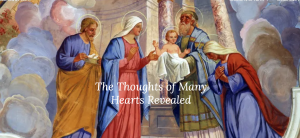“The LOWEST BAR of REPRESENTING, PRESENTING ” Christ as the Savior” is to be sure to SOW (show) my/your, OUTSIDE genuine Ministry, Leader, Lay “REAL RESPECT” (as it is “inwardly perceived, assessed and discerned…. by MANY) (“let the (inside) love God be shed abroad in your hearts ..which is pictured like a giant lighthouse on the seacoast, beaming out it’s light into the darkness…in perceivable, visable rays)
Sister T Implores the Gung Ho Spirit Baptized ( mostly)

PART 1 “MINISTRY AI AND I”
CHRIST THE SAVIOR: THE TRIGGER OF CHOSEN HUMAN HEARTS
Simeon’s Prophecy Over Christ and Its Modern Applications
Luke 2:34-35 (KJV): “And Simeon blessed them, and said unto Mary his mother, Behold, this child is set for the fall and rising again of many in Israel; and for a sign which shall be spoken against; (Yea, a sword shall pierce through thy own soul also,) that the thoughts of many hearts may be revealed.”
PART 2 will include this:
Isaiah 9:6 (KJV): “For unto us a child is born, unto us a son is given: and the government shall be upon his shoulder: and his name shall be called Wonderful, Counsellor, The mighty God, The everlasting Father, The Prince of Peace
Dr. T asks ChatGPT AI to expound the deepest meaning of Simeon’s Prophecy: What does it mean that “many hearts will be revealed” (we realized this is outline form, simplistic, however, we’ll ‘Go there’ to prog us and remind our own particular kinds of memories, hearts.

The prophecy Simeon spoke over the Christ child foretold a universal truth: encountering Jesus would reveal the true nature of people’s hearts. This theme is woven throughout the New Testament as individuals from various walks of life encountered Him or heard of His name and mission.
- Herod the Great (Matthew 2:1-16):
- Upon hearing of the birth of the “King of the Jews,” Herod’s heart was revealed through fear, insecurity, and hostility. His reaction led to the tragic massacre of the innocents in Bethlehem. Herod’s paranoia and rejection of Jesus’ kingship underscore a heart unwilling to submit to God’s authority.
- Greek Term: “King” (βασιλεύς, basileus), as applied to Jesus, signified a challenge to Herod’s temporal power, provoking his violent response.
- The Pharisees and Sadducees:
- The Pharisees’ interactions with Jesus often revealed their pride, hypocrisy, and resistance to change (Matthew 23:27-28). Despite witnessing miracles and hearing profound teachings, they hardened their hearts and sought to discredit Him.
- The Sadducees, who rejected resurrection and supernatural intervention, also confronted Jesus with skepticism (Mark 12:18-27).
- Aramaic Insight: The word “hypocrite” (from hypokritēs) draws from acting, symbolizing their outward display of piety masking inward corruption.
- The Woman at the Well (John 4:7-30):
- Her encounter with Jesus revealed a heart longing for truth and transformation. As Jesus unveiled her life story and offered living water, she responded in faith and became a witness to her community.
- Hebrew Parallel: The concept of “living water” (מים חיים, mayim chayim) ties to God’s provision and renewal in the Old Testament, resonating deeply with her.
- The Rich Young Ruler (Mark 10:17-22):
- When confronted with the cost of discipleship, his heart’s attachment to wealth was exposed. Despite his moral uprightness, he walked away sorrowful, unwilling to surrender fully to Jesus.
- The Crowd at the Crucifixion (Mark 15:13-14):
- The hearts of many were revealed through their rejection of Jesus and preference for Barabbas, a known criminal. Their response reflected fear, manipulation, and spiritual blindness.

Simeon’s Prophecy Applied to Modern Society
Simeon’s words resonate beyond the first-century context, exposing the hearts of individuals and systems across history and into today’s world.
The mere mention of Jesus’ name often evokes strong, polarized reactions, revealing where individuals stand in their relationship to Him.
- Religious Institutions:
- Many churches and religious systems today mirror the Pharisees in their struggles with pride, legalism, and superficial displays of faith. When confronted with Jesus’ call to authentic love and humility, some institutions embrace transformation, while others resist.
- Reflection: Do modern religious leaders align their ministries with the servant-leadership of Christ, or are their hearts revealed through division, greed, or control?
- Cultural and Political Systems:
- Throughout history, Jesus’ name has challenged empires, ideologies, and systems of oppression. Today, debates about religious freedom, morality, and justice often expose the biases and values of societies.
- Hebrew Term: “Government” (משרה, misrah) in Isaiah 9:6 implies a rule of justice and peace, standing in contrast to human governments prone to corruption and conflict.
- Personal Relationships:
- Individuals’ responses to Jesus reveal their hearts. Some embrace Him with childlike faith, while others reject Him out of fear, pride, or apathy. Simeon’s prophecy reminds us that Jesus confronts every heart, demanding a decision.
- The Digital Age:
- In online spaces, the name of Jesus still reveals hearts. Social media debates, anonymous comments, and public expressions of faith often show whether people are “hot,” “cold,” or “lukewarm” (Revelation 3:15-16).
- Challenge: How do we as believers represent Christ in digital spaces? Do our online interactions reflect His grace and truth?

First Love or Resistance: The Polarizing Effect of Christ
Simeon’s prophecy warns that Jesus is a “sign which shall be spoken against.” His name continues to polarize, dividing hearts into those who embrace Him and those who reject Him. This polarity is evident in:
- First Love Relationship:
- Believers who are “hot” for Christ demonstrate passion, humility, and obedience. Their hearts reflect gratitude for salvation and a desire to spread His love.
- Example: Modern-day missionaries, intercessors, and everyday believers living out their faith authentically.
- Resistance and Rejection:
- Others react with hostility or indifference. Secularism, atheism, and anti-Christian sentiment often reveal hearts unwilling to confront sin or surrender to God’s authority.
- Reflection: What causes resistance? Fear of change, misunderstanding, or hardened pride?

Personal Reflection
- My Heart:
- Simeon’s prophecy challenges me to examine my own heart. Do I live in the passion of “first love” for Christ, or have I allowed pride, fear, or apathy to creep in?
- Your Heart:
- Each reader is invited to reflect: How does your heart respond to Jesus’ name? Are you drawn to His light, or do you shrink back in resistance?
- Corporate Reflection:
- As communities, are we revealing hearts aligned with Christ’s kingdom of peace, justice, and love? Or do our systems reflect division and self-interest?

Conclusion
Simeon’s prophecy over the Christ child is a timeless call to examine the heart. From Herod’s fear to the Pharisees’ pride, from the faith of the woman at the well to the sorrow of the rich young ruler, history illustrates the universal truth that Jesus reveals the thoughts of all.
Today, as in every age, the mention of His name continues to challenge individuals, institutions, and societies to align with His truth. May we all strive to have hearts that rise in faith and humility rather than fall in pride and rejection.
TO SOW:
(C)2024 Taveau D’Arcy All copyrights reserved under interternational copyright laws, in conjunction with AI
